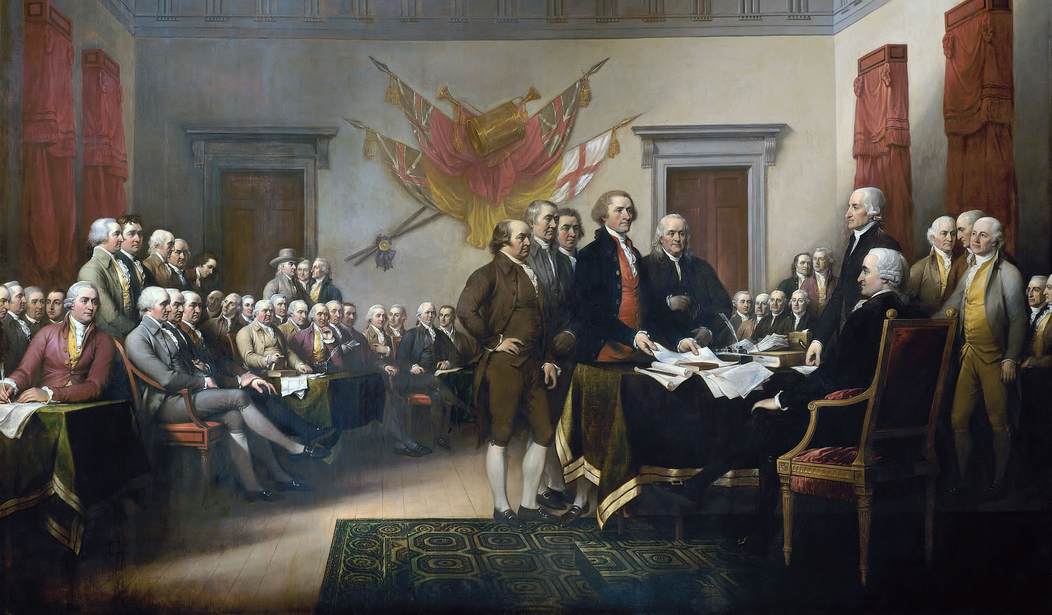Listen, my children, and you shall hear of the midnight ride of … Caesar Rodney. While Rodney might not have a famous poem written about his nighttime journey, his ride was just as historic as Revere’s and vital to the passage of the July 1776 Declaration of Independence.
On July 2, 1776, the delegates for 13 colonies at the Continental Congress voted for American independence from Great Britain. (It then took the delegates two days to agree on an edited draft for the public, hence our July 4 holiday.) But what many Americans don’t know is that, on July 1, independence hung in the balance — and one man came to break a tie and ensure the establishment of a new nation.
Before the Revolution, Caesar Rodney had already been involved in politics, having served as a Justice of the Superior Court for the Three Lower Counties and a colonial legislator. Indeed, according to the National Park Service (NPS), Rodney had attended the 1765 Stamp Act Congress, and he had “usurped the prerogative of the proprietary Governor by calling a special meeting of the legislature at New Castle” after Parliament closed Boston’s harbor in 1774. Then Rodney went with his former collaborators, Thomas McKean and George Read, to be delegates for Delaware in the First Continental Congress.
During his time in the Continental Congress, however, Rodney periodically returned to Delaware for military or political duties (he was a militia colonel). NPS states that Caesar Rodney was investigating Loyalists in Delaware when he received a historic dispatch from McKean.
On July 1, 1776, Rodney received a letter from Philadelphia in Dover, Del. The Continental Congress had scheduled a vote for the very next day, July 2, on the proposal from Virginian Richard Henry Lee that “these united colonies are, and of right ought to be free and independent states.”
The two Delaware delegates who were in Philadelphia at the time, McKean and Read, did not agree on whether to vote for the colonies’ independence. Read did not at the moment favor the vote for independence (although he would end up signing the Declaration), while McKean was in favor of it. Caesar Rodney was needed to break the Delaware delegates’ tie. Rodney was passionately devoted to the cause of American independence and, despite his habitual bad health, he determined to be in Philadelphia the next day to vote for that independence.
[1776 History] Rodney got on his horse and rode for eighteen straight hours and over eighty miles through thunder and rain to get to Philadelphia before the vote, a ride that usually took two days. He stopped only to change horses. As if straight out of a Hollywood movie, it is said that the other Congressional delegates heard the hoofbeats on the cobblestones outside the convention hall, and in came Caesar Rodney, near exhaustion, covered in mud, with spurs still attached, to break his state’s tie to vote in favor of independence.
Rodney might not have looked the part of a hero. Among his various physical ailments were a skin cancer that disfigured his face, and which he tried to hide with a green silk veil. But that day, at the Continental Congress, the asthmatic Delaware delegate was the crucial man, the hinge, the hero, the necessary vote deciding if America would be independent or no. Rodney arrived in time, Delaware voted for independence, and the rest, as they say, is history.
NPS notes that Rodney did not exactly get the appreciation he deserved from his fellow Delaware citizens, considering how hard he had driven himself to stand for their liberties. Conservatives in Delaware, infuriated at what they saw as Rodney’s foolish vote, did not reelect him to Congress nor to the legislature, and he was not appointed to the state constitutional convention. Nothing daunted, Rodney recruited troops and participated in minor military actions in both Delaware and New Jersey. He was commissioned a major general in September 1777.
Rodney finally began to be honored by Delaware lawmakers again, as the legislature designated him an admiralty judge in the following spring. By December, he was reelected to the Continental Congress and later nominated as state president for the years 1778-81. Rodney continued to use his positions to support Delaware’s Revolutionary War effort. In 1783, he became Delaware’s state senate speaker, but he died the following year.
Exclusively for our VIPs: CCP Boasts of Its (Genocidal) 103-Year History
Up to the moment of his death, Founding Father Caesar Rodney exhausted himself taking on every office and task he could to further the cause of American independence. He did live long enough to see the American Army under George Washington defeat the British decisively, and to know of the Treaty of Paris ending the Revolution and recognizing America’s independence. The night Caesar Rodney rode 80 miles in a storm to vote for the Declaration of Independence, he could not know what the future would hold, but he did dare to take the decisive step to shape it.
Caesar Rodney might have been executed as a traitor if the Revolution failed, but he was not afraid. And to him, and to every member of the Continental Congress who signed the immortal Declaration in July 1776, we owe the greatest honor and the deepest gratitude.










Join the conversation as a VIP Member